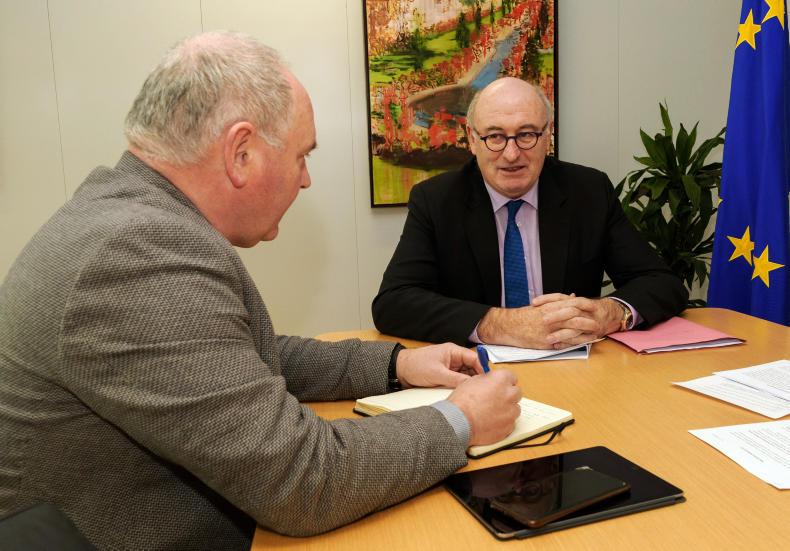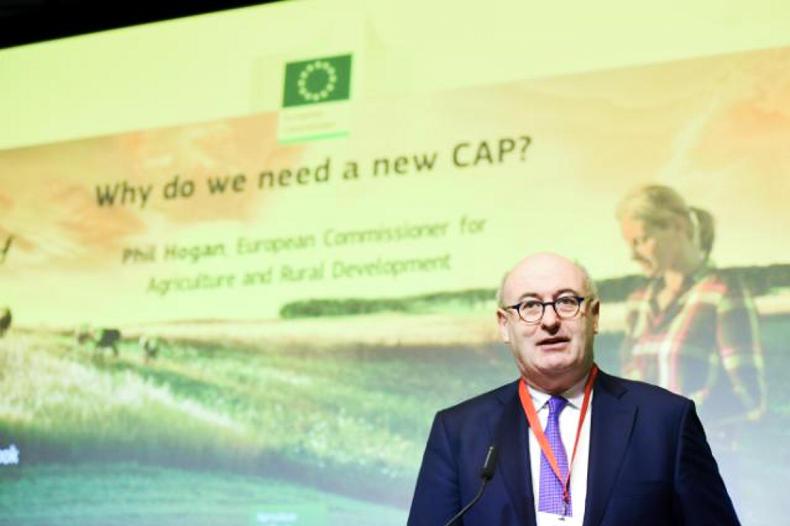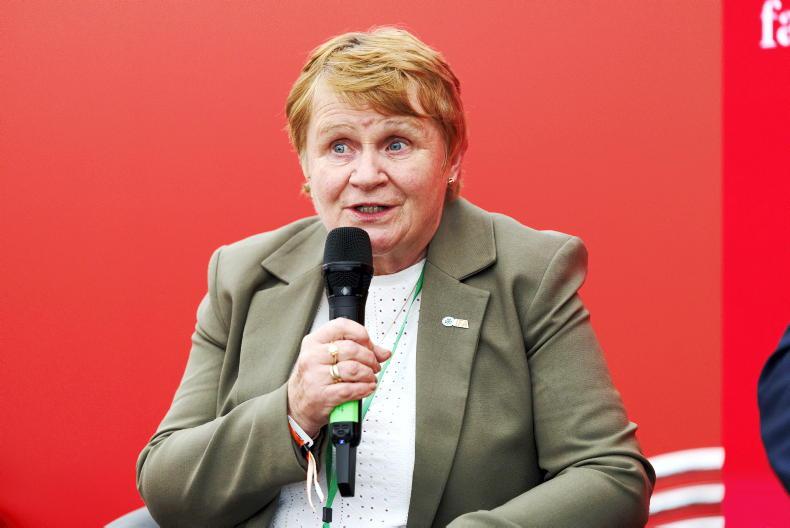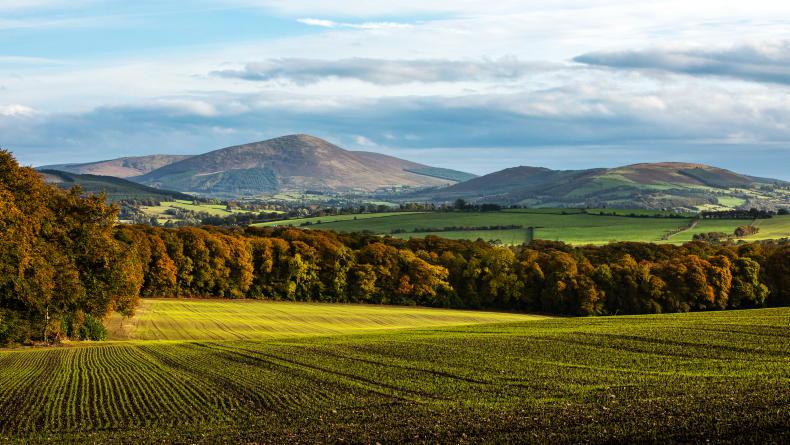A two-day conference on the outlook for EU agriculture was held in Brussels this week. Proceedings were opened by the Commissioner Phil Hogan who explained the purpose and ambition of his CAP proposals for the support of farming after 2020.
Listen to "Phil Hogan at EU Agricultural Outlook Conference" on Spreaker.
He explained the reasoning behind involving member states more in the delivery of the CAP and emphasised that this would not be a renationalisation of agriculture but rather a more efficient way to deliver a common policy.
Commissioner Hogan broadened his address to cover his ambitions on tackling unfair trading practices in 2018 and gave a brief summary of last week’s Mercosur discussions which had been predicted to reach a deal but failed to do so.
These will resume in the new year and while no new offer was made on beef, the EU are waiting for a Mercosur response on a number of issues that they have raised.
Depending on how positive the response is to these from an EU perspective, the greater the likelihood the pressure will come from a further beef offer in addition to the 70,000t already on the table.
Key element
They key element of the CAP after 2020 will be the available budget, and the EU budget commissioner Günther Oettinger reminded delegates of the gap that the departure of the UK would leave in the EU budget.
Alongside this loss of resource, he also described additional areas of activity in which the EU will have to engage that will demand resources not currently in place.
These include development of an EU defence policy and border inspections.
Migration and refugees are issues that will require an EU response, best delivered according to the budget commissioner through development aid.
Research and development of new technology was also identified as a requirement of resource and combined these “new” ambitions are likely to have a price tag in the region of €10bn at a time when the budget will lose up to €14bn with the UK departure.
The Multiannual Financial Framework (MFF)is the mechanism that is used to put in place a budget for the EU that runs for between five and seven years. The MFF that will be negotiated by the members during 2018 will determine what is available for the CAP after 2020.

EU Agriculture Commissioner Phil Hogan speaking to Phelim O'Neill, Irish Farmers Journal on his proposals for CAP 2020
The budget commissioner outlined how the loss of the UK contribution could be replaced by member states increasing contribution from 1% of Gross National Income (GNI) to 1.1% or ideally 1.2% to replace the UK gap.
However, with the new areas of expenditure identified, he believed that that would require new money, while the Brexit gap should be met by a 50% cut of funding to existing programmes and 50% through increased member state contribution.
While the budget commissioner concentrated on the problems facing EU finances and in the process the CAP budget, he also did commit to funding the CAP and recognised its value to the EU.
He urged participants in the conference to go out and defend the CAP to the NGOs and wider EU population. He was strong on not going back to national budgets which he felt would damage the single market and promised that while cuts may be necessary they won’t be drastic.
Outlook
The conference outlook extended to 2030 and, as is inevitable with any long-term forecasts, there were plenty of caveats included in presentations. On meat in general EU consumption is expected to be stable at best.
On the supply side, after the turbulence of the ending of quotas, production is expected to be stable in 2017 but in the longer term is forecast to gradually decline in the EU.
Sheep on the other hand after years of decline are expected to show a small increase due to better profitability.
China has driven the pig meat sector recently but in the longer term production is expected to stabilise with consumption flat in the EU and strong competition in international markets.
As well as the commissioner, professor Alan Matthews, Trinity College Dublin and professor Thia Hennessey, University College Cork, Angus Woods, IFA livestock chair was a member of the panel that explored the meat and dairy outlook.
He told the conference that he welcomed Commissioner Hogan’s strong stance on the CAP budget and direct payments and contrasted it with Trade Commissioner Malmstrom’s sell out policy on Mercosur that was undermining the CAP.
Read more
Listen: Commission 'not shirking responsibility' with more national CAP – Hogan
Analysis: EU parks the bus on Mercosur
A two-day conference on the outlook for EU agriculture was held in Brussels this week. Proceedings were opened by the Commissioner Phil Hogan who explained the purpose and ambition of his CAP proposals for the support of farming after 2020.
Listen to "Phil Hogan at EU Agricultural Outlook Conference" on Spreaker.
He explained the reasoning behind involving member states more in the delivery of the CAP and emphasised that this would not be a renationalisation of agriculture but rather a more efficient way to deliver a common policy.
Commissioner Hogan broadened his address to cover his ambitions on tackling unfair trading practices in 2018 and gave a brief summary of last week’s Mercosur discussions which had been predicted to reach a deal but failed to do so.
These will resume in the new year and while no new offer was made on beef, the EU are waiting for a Mercosur response on a number of issues that they have raised.
Depending on how positive the response is to these from an EU perspective, the greater the likelihood the pressure will come from a further beef offer in addition to the 70,000t already on the table.
Key element
They key element of the CAP after 2020 will be the available budget, and the EU budget commissioner Günther Oettinger reminded delegates of the gap that the departure of the UK would leave in the EU budget.
Alongside this loss of resource, he also described additional areas of activity in which the EU will have to engage that will demand resources not currently in place.
These include development of an EU defence policy and border inspections.
Migration and refugees are issues that will require an EU response, best delivered according to the budget commissioner through development aid.
Research and development of new technology was also identified as a requirement of resource and combined these “new” ambitions are likely to have a price tag in the region of €10bn at a time when the budget will lose up to €14bn with the UK departure.
The Multiannual Financial Framework (MFF)is the mechanism that is used to put in place a budget for the EU that runs for between five and seven years. The MFF that will be negotiated by the members during 2018 will determine what is available for the CAP after 2020.

EU Agriculture Commissioner Phil Hogan speaking to Phelim O'Neill, Irish Farmers Journal on his proposals for CAP 2020
The budget commissioner outlined how the loss of the UK contribution could be replaced by member states increasing contribution from 1% of Gross National Income (GNI) to 1.1% or ideally 1.2% to replace the UK gap.
However, with the new areas of expenditure identified, he believed that that would require new money, while the Brexit gap should be met by a 50% cut of funding to existing programmes and 50% through increased member state contribution.
While the budget commissioner concentrated on the problems facing EU finances and in the process the CAP budget, he also did commit to funding the CAP and recognised its value to the EU.
He urged participants in the conference to go out and defend the CAP to the NGOs and wider EU population. He was strong on not going back to national budgets which he felt would damage the single market and promised that while cuts may be necessary they won’t be drastic.
Outlook
The conference outlook extended to 2030 and, as is inevitable with any long-term forecasts, there were plenty of caveats included in presentations. On meat in general EU consumption is expected to be stable at best.
On the supply side, after the turbulence of the ending of quotas, production is expected to be stable in 2017 but in the longer term is forecast to gradually decline in the EU.
Sheep on the other hand after years of decline are expected to show a small increase due to better profitability.
China has driven the pig meat sector recently but in the longer term production is expected to stabilise with consumption flat in the EU and strong competition in international markets.
As well as the commissioner, professor Alan Matthews, Trinity College Dublin and professor Thia Hennessey, University College Cork, Angus Woods, IFA livestock chair was a member of the panel that explored the meat and dairy outlook.
He told the conference that he welcomed Commissioner Hogan’s strong stance on the CAP budget and direct payments and contrasted it with Trade Commissioner Malmstrom’s sell out policy on Mercosur that was undermining the CAP.
Read more
Listen: Commission 'not shirking responsibility' with more national CAP – Hogan
Analysis: EU parks the bus on Mercosur











SHARING OPTIONS